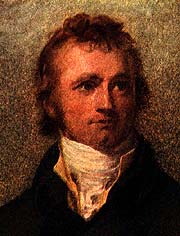Alexander Mackenzie
 |
| The Scottish explorer Alexander MacKenzie, was the first explorer to cross North America by land to the Pacific Ocean. The trip left him disenchanted with the region. Image © 2002 www.clipart.com. |
Meriwether Lewis and William Clark weren't the first European-Americans to cross North America to the Pacific. That distinction belongs to Alexander Mackenzie.
In 1793, 12 years before the Lewis and Clark expedition reached the Pacific, Mackenzie reached the Dean Channel to the Pacific Ocean in today's British Columbia. On a rock above the channel, he inscribed, "Alexander Mackenzie, from Canada, by land, the twenty-second of July, one thousand, seven hundred and ninety-three."
The young Scotsman found little joy in his end. A fur trader for the North West Company, Mackenzie was driven by a simple goal—to make money. His aim was to find a water route to the Pacific, and thus a quicker way to trade with China and the Far East. This trip was the second time he had tried to find a water route to the Pacific Ocean. The first time in 1789 he traveled the length of what is now the Mackenzie River, only to find that it traveled north to the Arctic Ocean. When he did reach the Pacific, it was only after abandoning a water route. Once Mackenzie found that none of the rivers north or west would work for the fur trade, he left this country and never returned. He later wrote, "I think it unpardonable in any man to remain in this country who can afford to leave it."
Despite his own disappointment, Mackenzie found a hungry audience in President Jefferson and Meriwether Lewis. When Mackenzie's ghost-written journal, Voyages from Montreal, was published in 1801, Jefferson quickly ordered one. It didn't arrive until 1802, but Jefferson and Lewis devoured it when it came.
Mackenzie helped further some of Jefferson's misconceptions. In particular, his description of the Rockies reinforced Jefferson's view that they were no more imposing than the Appalachians in the East.
Lewis was most driven by Mackenzie's name on that rock. Lewis feared that the West could be lost to the British if the United States did not act quickly.
In 1802 Mackenzie was knighted for his achievements. In later years he fought against his company's rival, the Hudson's Bay Company, and its efforts to monopolize the fur trade.
Mackenzie died in his native Scotland in 1829 at the age of 52.
< back | next > | 


